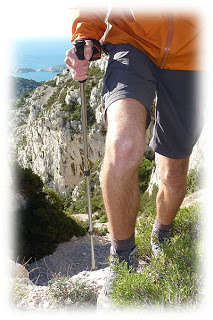Physical Attributes Entry: Knees

By Memphre via Wikimedia Common
Physical description of a character can be difficult to convey--too much will slow the pace or feel 'list-like', while too little will not allow readers to form a clear mental image. If a reader cannot imagine what your character looks like, they may have trouble connecting with them on a personal level, or care about their plight.
One way to balance the showing and telling of physical description is to showcase a few details that really help 'tell the story' about who your character is and what they've been through up to this point. Think about what makes them different and interesting. Can a unique feature, clothing choice or way they carry themselves help to hint at their personality? Also, consider how they move their body. Using movement will naturally show a character's physical characteristics, keep the pace flowing and help to convey their emotions.
Descriptors: dimpled, wrinkled, knobby, bulging, scabbed, scraped, scarred, hairy, lumpish, chapped, blotchy, freckled, knotted, dry, smooth, cracked, leathery, creaking, popping, grinding, arthritic, bandaged, weak, soft, rough, swollen
Things Knees Do:
Bend: stiff; rapid; awkwardly; painfully
Stiffen: clench; tighten; support; strengthen
Give out: tremble and release, causing collapse; momentarily weakness which causes a hitch and catch
Key Emotions and Related Knee Movements:
Fear: loosen, tremble, clench together, bring knees up to core, making oneself smaller & less noticeable
Unease: rubbing or stroke knees to soothe, gripping knees with hands, moving knees, shifting the body, picking at scabs to take mind off of feeling
Excitement: stiffen, tighten, lock
Relief: weaken, loosen, soften, sag, give out
Simile & Metaphor help:
Bony: Her bulging knees creaked as she sat, a knobby reminder of her ski accident.
Dry: Her pinched knees lined up just below her dress hem, white and chapped like she'd knelt in chalk.
Clichés to Avoid:
knees knocking together; knees giving out as a prelude to uncontrollable weeping
HINT: When describing any part of the body, try to use cues that show the reader more than just a physical description. Make your descriptions do double duty.
Example: The old man wore a faded Army cap and walked like his joints pained him. With every step, his knees strained and groaned, trying to hold their weight. Like soldiers carrying too-heavy packs, they struggled gamely on, doing the only thing they knew to do.
BONUS TIP: The Colors, Textures & Shapes Thesaurus in our sidebar might help you find a fresh take on some of the descriptors listed above!

Published on October 06, 2012 04:00
No comments have been added yet.
Writers Helping Writers
A place for writers to find support, helpful articles on writing craft, and an array of unique (and free!) writing tools you can't find elsewhere. We are known far and wide for our "Descriptive Thesau
A place for writers to find support, helpful articles on writing craft, and an array of unique (and free!) writing tools you can't find elsewhere. We are known far and wide for our "Descriptive Thesaurus Collections" which help authors create vivid imagery and sensory detail for their Settings, Characters (physical descriptions, emotions, skills & talents, etc.), Symbolism, Weather, and a whole bunch more. Stop in and say hello! :) http://writershelpingwriters.net/
...more
- Angela Ackerman's profile
- 1017 followers



